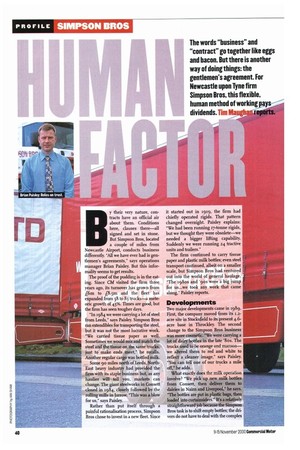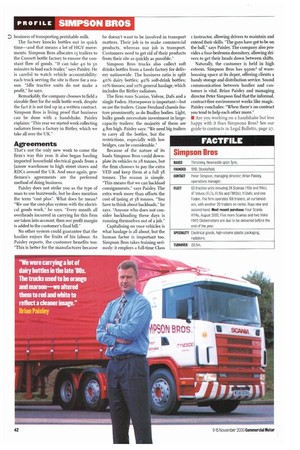y their very nature, contracts have an official air about
Page 42

Page 44

If you've noticed an error in this article please click here to report it so we can fix it.
them. Conditions here, dauses there—all signed and set in stone. But Simpson Bros, located a couple of miles from Newcastle Airport, conducts business differently. "All we have ever had is gentlemen's agreements," says operations manager Brian Paisley. But this informality seems to get results.
The proof of the pudding is in the eating. Since CM visited the firm three years ago, its turnover has grown from gm to £8.5m and the fleet has expanded from 58 to 83 trucks—a meteoric growth of 43%. Times are good, but the firm has seen tougher days.
"In 1984 we were carrying a lot of steel from Leeds," says Paisley. Simpson Bros ran extendibles for transporting the steel, but it was not the most lucrative work. "We carried tissue paper as well. Sometimes we would mix and match the steel and the tissue on the same trucks, just to make ends meet," he recalls. Another regular cargo was bottled milk.
Some 90 miles north of Leeds, NorthEast heavy industry had provided the firm with its staple business but, as any haulier will tell you, markets can change. The giant steelworks in Conwtt dosed in 1984, closely followed by the rolling mills in Jarrow. "This was a blow for us," says Paisley.
Rather than put itself through a painful rationalisation process, Simpson Bros chose to invest in a new fleet. Since
it started out in 1919, the firm had chiefly operated rigids. That pattern changed overnight. Paisley explains: "We had been running 17-tonne rigids, but we thought they were obsolete—we needed a bigger lifting capability. Suddenly we were running 24 tractive units and trailers."
The firm continued to carry tissue paper and plastic milk bottles; even steel transport continued, albeit on a smaller scale, but Simpson Bros had ventured out into the world of general haulage. "The 198os and '9os were a big jump for us...we took any work that came along," Paisley reports.
Developments
Two major developments came in 1989. First, the company moved from its 1.2acre site in Stocks6eld to its present 4.6acre base in Throddey. The second change to the Simpson Bros business was more cosmetic. "We were carrying a lot of dairy bottles in the late '8os. The trucks used to be orange and maroon— we altered them to red and white to reflect a cleaner image," says Paisley. "You can tell one of our trucks a mile off," he adds.
What exactly does the milk operation involve? "We pick up new milk bottles from Consett, then deliver them to dairies in Nairn and Liverpool," he says. "The bottles are put in plastic bags, then loaded into curtainsiders." It's a relatively straightforward job because the Simpson Bros task is to shift empty bottles; the drivers do not have to deal with the complex business of transporting perishable milk.
The factory knocks bottles out in quick time—and that means a lot of HGV movements. Simpson Bros allocates 15 trailers to the Consett bottle factory to ensure the constant flow of goods. It can take 40 to 5o minutes to load each trailer," says Paisley. He is careful to watch vehicle accountability: each truck serving the site is there for a reason. "Idle tractive units do not make a profit," he says.
Remarkably, the company chooses to field a sizeable fleet for the milk bottle work, despite the fact it is not tied up in a written contract. Simpson Bros is living proof that business can be done with a handshake. Paisley explains: "This year we started work collecting radiators from a factory in Birtley, which we take all over the UK."
Agreements
That's not the only new work to come the firm's way this year. It also began hauling imported household electrical goods from a Jarrow warehouse to high street stores and RDCs around the UK. And once again, gentlemen's agreements are the preferred method of doing business.
Paisley does not strike you as the type of man to use buzzwords, but he does mention the term "cost plus". What does he mean? "We use the cost-plus system with the electrical goods work," he says. "Every month all overheads incurred in carrying for this firm are taken into account, then our profit margin is added to the customer's final bill.'
No other system could guarantee that the haulier enjoys the fruits of his labour. As Paisley reports, the customer benefits too: "This is better for the manufacturer because he doesn't want to be involved in transport matters. Their job is to make commercial products, whereas our job is transport. Customers need to get rid of their products from their site as quickly as possible."
Simpson Bros trucks also collect soft drinks bottles from a Leeds factory for delivery nationwide. The business ratio is split 40% dairy bottles; 40% soft-drink bottles; ro% tissues; and ro% general haulage, which includes the Birtley radiators.
The firm runs Scanias, Volvos, Dafs and a single Foden. Horsepower is important—but so are the trailers. Crane Freuhauf chassis feature prominently, as do Boalloy bodies. Light, bulky goods necessitate investment in largecapacity trailers; the majority of them are 4.8m high. Paisley says: "We need big trailers to carry all the bottles, but the restrictions, especially with low bridges, can be considerable."
Because of the nature of its loads Simpson Bros could downplate its vehicles to 28 tonnes, but the firm chooses to pay the extra VED and keep them at a full 38 tonnes. The reason is simple. "This means that we can bacldoad consignments," says Paisley. The extra work more than offsets the cost of taxing at 38 tonnes. "You have to think about backloads," he says. "Anyone who does not consider backloading these days is running themselves out of a job."
Capitalising on your vehicles is what haulage is all about, but the human factor is important too. Simpson Bros takes training seriously: it employs a full-time Class r instructor, allowing drivers to maintain and extend their skills. "The guys have got to be on the ball," says Paisley. The company also provides a four-bedroom dormitory, allowing drivers to get their heads down between shifts.
Naturally, the customer is held in high esteem. Simpson Bros has 930m2 of warehousing space at its depot, offering clients a handy storage and distribution service. Sound communication between haulier and customer is vital. Brian Paisley and managing director Peter Simpson find that the informal, contract-free environment works like magic. Paisley concludes: "When there's no contract you tend to help each other more."
• Are you working on a handshake but less happy with it than Simpsons Bros? See our guide to contracts in Legal Bulletin, page 27.




































































































